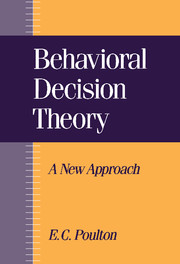Book contents
- Frontmatter
- Acknowledgments
- Contents
- Preface
- Chapter 1 Outline of heuristics and biases
- Chapter 2 Practical techniques
- Chapter 3 Apparent overconfidence
- Chapter 4 Hindsight bias
- Chapter 5 Small sample fallacy
- Chapter 6 Conjunction fallacy
- Chapter 7 Regression fallacy
- Chapter 8 Base rate neglect
- Chapter 9 Availability and simulation fallacies
- Chapter 10 Anchoring and adjustment biases
- Chapter 11 Expected utility fallacy
- Chapter 12 Bias by frames
- Chapter 13 Simple biases accompanying complex biases
- Chapter 14 Problem questions
- Chapter 15 Training
- Chapter 16 Overview
- References
- Index
Chapter 12 - Bias by frames
Published online by Cambridge University Press: 06 July 2010
- Frontmatter
- Acknowledgments
- Contents
- Preface
- Chapter 1 Outline of heuristics and biases
- Chapter 2 Practical techniques
- Chapter 3 Apparent overconfidence
- Chapter 4 Hindsight bias
- Chapter 5 Small sample fallacy
- Chapter 6 Conjunction fallacy
- Chapter 7 Regression fallacy
- Chapter 8 Base rate neglect
- Chapter 9 Availability and simulation fallacies
- Chapter 10 Anchoring and adjustment biases
- Chapter 11 Expected utility fallacy
- Chapter 12 Bias by frames
- Chapter 13 Simple biases accompanying complex biases
- Chapter 14 Problem questions
- Chapter 15 Training
- Chapter 16 Overview
- References
- Index
Summary
Summary
The same pair of outcomes can be presented in different frames or contexts. Changing the frame can be made to reverse the preferences for the outcomes. The heuristic bias could be said to be using the frame in choosing between the outcomes. Anyone who is able to avoid being biased by the frame could be said to follow the normative rule.
Changing the reference level frame can be made to change a sure gain into a sure loss, and so to reverse the preferences. The probabilities that distinguish 2 options can be isolated from the probabilities that both options share. Changing the frame by isolating the distinguishing probabilities can be made to change a probable gain into a sure gain, and so to reverse the preferences for the 2 options. The choice between a small sure loss and a larger less probable loss can be framed as a preference or as an insurance premium. The small sure loss is more often chosen when framed as insurance.
In theory, bias by frames could be avoided, provided the cover story and options together present all the facts. But ordinary respondents would probably have to be warned against the bias and be taught how to deal with it. Changing the frame from the probability of survival to the probability of death may reduce the apparent difference between surgical and medical treatments, and so the preference for surgical treatment.
- Type
- Chapter
- Information
- Behavioral Decision TheoryA New Approach, pp. 220 - 240Publisher: Cambridge University PressPrint publication year: 1994



